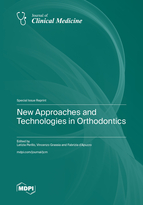New Approaches and Technologies in Orthodontics
A special issue of Journal of Clinical Medicine (ISSN 2077-0383). This special issue belongs to the section "Dentistry, Oral Surgery and Oral Medicine".
Deadline for manuscript submissions: closed (30 November 2023) | Viewed by 102424
Special Issue Editors
Interests: early treatment; nonextraction treatment; dentofacial orthopedics; cleft; genetics
Special Issues, Collections and Topics in MDPI journals
Interests: tooth movement; Tads; interdisciplinary approach; clear aligner
Special Issues, Collections and Topics in MDPI journals
Interests: early treatment; oro-facial pain; TMDs; orthodontic biomarkers
Special Issues, Collections and Topics in MDPI journals
Special Issue Information
Dear Colleagues,
In the last few years, new diagnostic and therapeutic approaches have been developed in orthodontics. New tools such as intraoral scanner, digital models, and cone beam computerized tomography have gradually spread, improving diagnoses, especially of impacted teeth, dental transpositions, and facial anomalies. The recent literature has also highlighted the important role of biomarkers in characterizing biological changes of tooth movement before and during treatment. Patients are focusing more on treatment time and aesthetics, so techniques to accelerate orthodontic movement, such as corticotomy, pulsed-light and mechanical vibrations, and clear aligners to improve aesthetics, are being used more frequently.
The aim of this Special Issue is to assess the scientific evidence of diagnostic and treatment innovations in orthodontics in order to expand our knowledge and support both scientific and clinical outcomes.
Thus, for the upcoming Special Issue in the Journal of Clinical Medicine (PubMed indexed ISSN 2077-0383; IF = 4.964), we are delighted to invite investigators to submit original research articles (trials, cohort studies, and case-control and cross-sectional studies), literature reviews (narrative or systematic reviews and meta-analyses), and high-quality case reports, all focusing on new orthodontic techniques or clinical solutions.
Prof. Dr. Letizia Perillo
Dr. Vincenzo Grassia
Dr. Fabrizia d'Apuzzo
Guest Editors
Manuscript Submission Information
Manuscripts should be submitted online at www.mdpi.com by registering and logging in to this website. Once you are registered, click here to go to the submission form. Manuscripts can be submitted until the deadline. All submissions that pass pre-check are peer-reviewed. Accepted papers will be published continuously in the journal (as soon as accepted) and will be listed together on the special issue website. Research articles, review articles as well as short communications are invited. For planned papers, a title and short abstract (about 100 words) can be sent to the Editorial Office for announcement on this website.
Submitted manuscripts should not have been published previously, nor be under consideration for publication elsewhere (except conference proceedings papers). All manuscripts are thoroughly refereed through a single-blind peer-review process. A guide for authors and other relevant information for submission of manuscripts is available on the Instructions for Authors page. Journal of Clinical Medicine is an international peer-reviewed open access semimonthly journal published by MDPI.
Please visit the Instructions for Authors page before submitting a manuscript. The Article Processing Charge (APC) for publication in this open access journal is 2600 CHF (Swiss Francs). Submitted papers should be well formatted and use good English. Authors may use MDPI's English editing service prior to publication or during author revisions.
Keywords
- orthodontics
- biomechanics
- early treatment
- dentofacial orthopedics
- nonextraction treatment
- miniscrews
- clear aligners
- cleft lip and palate
- TMJ disorders
- orofacial pain
Benefits of Publishing in a Special Issue
- Ease of navigation: Grouping papers by topic helps scholars navigate broad scope journals more efficiently.
- Greater discoverability: Special Issues support the reach and impact of scientific research. Articles in Special Issues are more discoverable and cited more frequently.
- Expansion of research network: Special Issues facilitate connections among authors, fostering scientific collaborations.
- External promotion: Articles in Special Issues are often promoted through the journal's social media, increasing their visibility.
- Reprint: MDPI Books provides the opportunity to republish successful Special Issues in book format, both online and in print.
Further information on MDPI's Special Issue policies can be found here.









